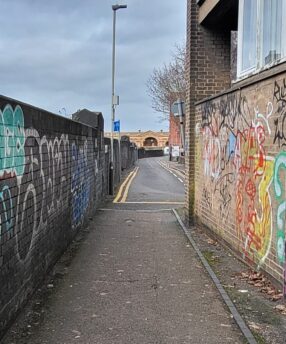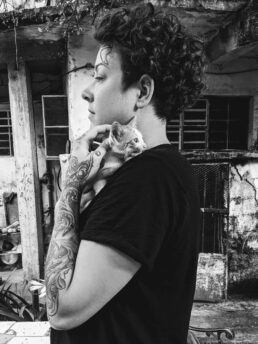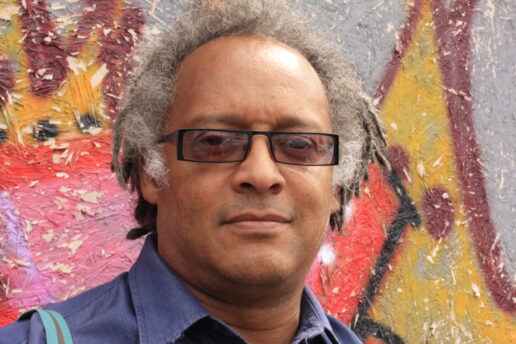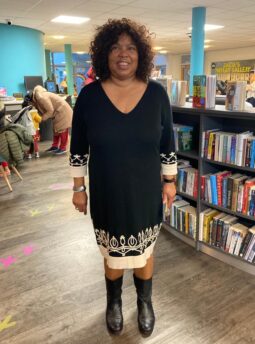Tribute to Jackie Hagan

In June 2024, we lost Jackie Hagan. She had been ill for a very long time, conditions with complicated manifestations and names to match.
Before
A lot of people remember the first time they met Jackie, but I don’t. We were at the University of Manchester at the same time, around 1999, 2000. She was in a relationship with a young woman I fancied from what was then called the LGB society. Some years later Jackie revealed she’d had a difficult time visiting her girlfriend’s unfriendly folks in their Lancashire mansion. I’d dodged a bullet, but Jackie took the hit.
She introduced me to so many writers and poets. I saw her perform many times in places like Sandbar and The Green Room, so often that I could mouth along to some of the lines. The first time I performed poetry was at a short-lived night she ran called ‘Hiya Luv’ (silent ‘H’), complete with its own button badge merch, in the dark damp back room at The Crescent in Salford. Jackie encouraged me to perform, as she did with so many other nervous novices. Her references to pop culture (we both grew up with Button Moon and The Wombles) and utter lack of pretension made poetry accessible. A possibility for new writers as I was back then.
When she facilitated writing workshops she always brought that encouragement with her. That, and being non-judgemental and accepting. It helped people to shine and grow. I think this came from her experiences of healthcare and disability, of the welfare benefits system, of growing up working class in Skelmersdale, of being skint, of being queer and non-binary, of all kinds of pain. She brought her openness and willingness to be vulnerable, more than I could ever be.
2024
The covid pandemic drove a lot of people away from each other for too many years. Running the Hard Pressed heritage project at Commonword gave me an excuse to get back in touch. My contact in the last few months of Jax’s life seems mercenary because it was work-related. I didn’t feel good about it. I knew she could see through me. But I also knew it was important to try to capture some of this history because it’s so fragile. As part of the project, I’d asked her friend the writer John G Hall to run some workshops based on issues of Citizen 32 (a 2000s magazine of political poetry and fiction) in Wythenshawe. I came to some of the sessions and Jackie was in attendance. One session was on the theme of war. The theme was too upsetting for her, so she coloured outside of the lines and wrote something completely different instead. She blew us all out of the water. Her brilliance came to her so easily and quickly, just like the way she made her observations.
John and I had talked about putting together a zine of poetry from these workshops that would be available at a poetry showcase at the Manchester Poetry Library in May. Jax had talked about doing a cover for the zine.
Shortly after the last Citizen 32 sessions, she went into hospital. The chances of her putting some of her magic and sparkle into this zine were dwindling. She messaged me on Facebook, quite last minute:
“Is it alright if I send u a poem for the zine or has this shit [sic] sailed”?
“No not at all.” I wanted anything and everything she wanted to send me.
But then a few days passed and I heard nothing. Looking through her debut collection that Citizen 32 had published, I dangled a proposal in front of her.
“How about this one?” I asked. A real woman. She didn’t recognise the title. The poem was probably around twenty years old. I took a picture of it and sent it to her. She wasn’t the same person who wrote it, she said. I told her it was still moving. She wanted to rework it. Thoughtful as ever, she didn’t want to get rid of anything that suggested the only real woman is a cisgender one. She made edits which I dutifully implemented.
I’d wanted her to do the zine cover too, but health and hospitals got in the way. Even so, she provided a cracking bio, all whilst being on a communal ward where it was kicking off “imagine molotov cocktails and beds against doors me on floor typing with one finger off it on morphine”. She’d lost feeling in her right hand (she is right-handed).
I described the in-progress zine to her. For a change, I was using software this time, not scissors and Pritt Stick. Serif font, monochrome and dead classy, automatically generated page numbers.
She replied to say she didn’t like the sound of it.
John had put her down to read at the showcase. I included a list of poets performing at the showcase. I asked if she was gonna be able to make it.
“Fuck yeah,” she wrote.
“Best thing I’ve heard all day,” I replied.
She was out of hospital one day before the showcase.
But on the evening, she was too tired to make it to Manchester Poetry Library. In my heart of hearts, I knew this might happen. I’d hoped that she’d be able to perform again, be on stage, have an audience, have a mic stand wrapped in fairy lights.
A few weeks later, she was back in hospital where her life ended. But that’s not how I want to remember her. She was so strong. She hid discomfort and pain a lot more than I realised. I think she was just trying to get on with her life. She wanted things to be nice for everyone, especially for the oddballs and misfits who miss out. She was sharp and funny as hell. Her honesty put a lot of her contemporaries to shame. Her honesty made people uncomfortable, but it was on the road to putting them at ease, giving them relief they didn’t know they needed. And I will miss her greatly for that. – Heena Patel







